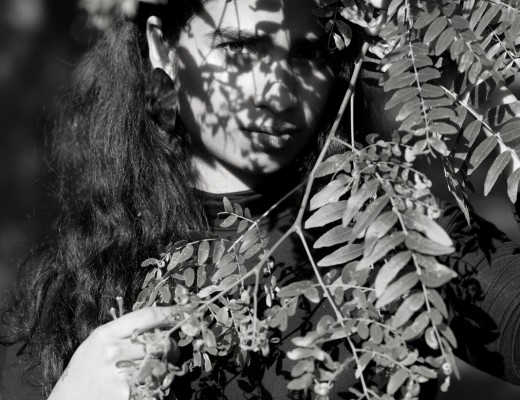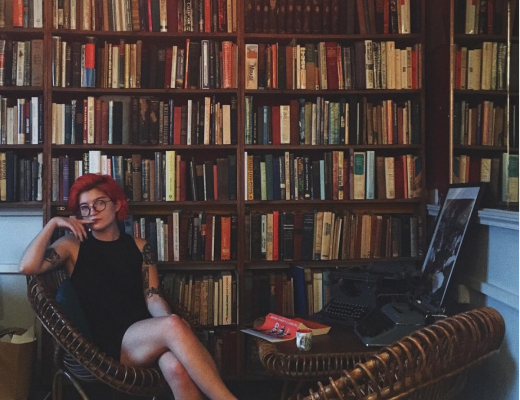Alana Massey is a writer on identity, culture, vice, and virtue and the author of All The Lives I Want: Essays About My Best Friends Who Happen To Be Famous Strangers. Her work has appeared in The Atlantic, Elle, The Guardian, Vice, New York Magazine, and dozens more. Her second book is forthcoming from Grand Central Publishing and her original television series The Skill Set is represented by Rezolution Pictures. She lives in the Catskills with her cat, her books, and her own nightmarish but tasteful interior design decisions.
An Interview with Alana Massey:
When and how did you first know you were a writer?
I am very externally focused when it comes to my identity: I want others to identify me as something before I identify myself that way and I don’t see this as a flaw or something to work on. I only know myself in relation to others. So when it came to writing, the first time I really felt that others saw me as a writer was when I published an essay in The New Inquiry called “You’re Right, I Didn’t Eat That” that went viral in 2014 and was shared and enjoyed by writers I respected. Seeing the distance it traveled digitally and the impact it had on readers made me feel like the writing I did functioned as more than space filler on high-volume sites and that I was actually speaking to an important cultural and social phenomenon that connected with readers.

What lessons gleaned from your experiences as a writer would you most want to share with yourself early in your career?
I would tell myself to always ask for more money. Always. Every time.
Did you have any mentors, or writers whom you looked up to / influenced you early in your career?
The people I wanted to emulate most in my early career were women around my age and sufficiently close to me in both perspectives and geography that it felt attain able. I just found their work so compelling, moving, and necessary. I made the decision not to be envious of these women but to seek them out as friends and mentors and I did it in such a way that wouldn’t be especially burdensome to them and never feeling entitled to their attention and time. Their generosity and creativity have been such a gift and I count them as friends today.
When your writing is personal, you ask for permission when you write about people you know. What brought you to make this a rule and has it ever been a limitation?
I believe that personal writing should always have a more universally applicable takeaway than “Here is a thing that happened to me and why it matters to me.” I care more about making it matter to someone else and bogging down those narratives with people who are particular to my life doesn’t serve that purpose. For the same reason, I don’t actually include much particular detail about myself because I understand my purpose in my own stories not to be a representation of my full reality so much as a filtered avatar of someone resembling for the reader to make the journey with. When I write about others, I feel I owe them the same protection and courtesy. I also believe that for people who have behaved in ways that are harmful but entirely human, it is unfair to write about them in ways that give them no recourse or way to defend themselves. I realize that there are two sides to every story, even when I am on one of them and convinced in my marrow that I was in the right in a situation. I know that for some people, writing and publishing are healing processes but I just haven’t had that as my experience. The limitations of withholding are that readers will fill in the blanks for you and make judgments based on details they’ve made up for you. I’ve had comments like, “Why do you pick such fucked up men when you come from such loving and supportive parents?” and “At least nothing worse happened to you IN REAL LIFE and it all happened in text messages!” And I wasn’t going to be like “Well, actually…” and explain that my parents were indeed supportive but deeply flawed and here are five reasons how or that I only included the text messages from an abusive person because I’d never reported anything else and didn’t want to be sued for suggesting anything that had no paper trail. So I just have to ignore comments that seek to diagnose and condemn me because it isn’t as worth it as maintaining good relations or protecting myself.
You write about having been seen as the “Manic Pixie Dream Girl” by a former boyfriend. How does the assignment of this categorization affect the perception of women?
The “Manic Pixie Dream Girl” as a type is part of a broader issue in perceptions of women that they must fit into a designated type. I know it is a totally harmless game, but it is telling that we have the cultural pastime of asking which character a woman in an ensemble is. The most famous is, “Are you a Carrie, a Samantha, a Miranda, or a Charlotte?” or the one about The Spice Girls but it is super common to sort of say, “Pick the pre-existing woman you are” as if the four or five to choose from are in anyway adequate to describe real women! This flattens women into their one, most consumable dimension and that makes women less human. It is the reason I wrote my book, All The Lives I Want, about famous women with some of the most one-dimensional legacies. Because we do often admire and sympathize with these women, I wanted to give women who have cautiously or privately loved them because they knew they were considered inadequate in the public consciousness a nudge in the direction of loving them without feeling it meant they too were inadequate. 
You wrote, “…the lazy assumption that women changing their hair is invariably about a change in their personalities and priorities.” What other lazy assumptions do you believe are made about women?
There are too many to list here but I think the one that is among the most destructive is that if we are brilliant, generous, or beautiful or any number of things that we are supposed to be, it is by our nature rather than our own design. There is an ingrained insistence that “effortless” everything is more virtuous in women: Exceptional scholar? She was a genius sprung from the womb! An ethereal beauty? She doesn’t spend hours fretting over her figure and makeup, that would be unbecoming! Great reputation for friendliness? She’s just a natural giver of her time and good nature! The hard work that goes into cultivating who we want to be is more easily erased and credited to magic than to our own rigorous and often highly calculating labor. It isn’t easy to get up every day and work out or study hard or learn to do a perfect cat eye or be nice to everyone you meet. It takes practice and work and an intention to build the life you want and the self you want to be. I think the idea of it being more pure or authentic somehow is the result of living in a culture that still doesn’t quite believe that women area capable of doing real labor.
Have you ever been asked to create content you were uncomfortable with? How would you define your boundaries in terms of accepting assignments and within your work?
I have been asked by editors to write content that I feel would be better assigned to someone whose identity or experiences give them more credibility to write about a topic. For example, when the Dr. Luke/Ke$ha news was first surfacing, he tweeted, “I have 3 sisters, a daughter, and a son with my girlfriend, and a feminist mom who raised me right” as if that rendered it impossible to rape someone. I was asked to write about this phenomenon of “I have a woman associate or family member and therefore am constitutionally incapable of hurting a woman.” I saw the invite and felt the was more common example of that was the “my black friend” alibi and that a black woman could speak to how both of those identities are taken advantage of so I declined to write it and suggested several black women who could do a better job. I’ve done the same thing when asked to write about sex work in the time since I stopped doing sex work as my primary income, because I am now less familiar and have lower stakes in what happens to current sex workers. It has been disappointing but in almost all of the cases where I’ve tried to pass on the job to more qualified people, the editors have not taken me up on it. It is a huge problem with the way media operates.
In defense of cliques, you write that “maintaining a small group of friends is about quality control of the friendships themselves.” How would you describe your experiences with this ‘quality control’ through your 20s?
I did almost no quality control of my friendships in my 20s because I spent most of my 20s without people actively seeking my friendship. As my career advanced toward the end of my 20s, I was so grateful to have people trying to be my friend that I always obliged. I would later realize that their intentions were often more about getting a shortcut to having my career or believing that I was that more digestible filtered avatar that I write myself as than as the imperfect human with the beating and breakable heart that I am. I moved away from New York City in 2016 in part to get away from a media industry where that kind of behavior was the norm. Now that I live in relative isolation in The Catskills, I realize which of my friends really care about me and which would only go so far (physically and metaphorically) to be close with me.
You admit that you are “inclined to bully meaning into spaces and objects that are void of significance.” How has this habit been part of your development as a writer?
Reading that now, I was being hard on myself and diminishing my own sensitivity as a flaw rather than an asset. I do not bully meaning into things, I try to witness them for long enough and with enough discernment to find their significance hiding in plain sight. It is a sensitivity that strengthens my writing, the tendency to always be connecting dots and experiences to one another. It is in some way, a belief in magic and destiny but I prefer that to the nihilistic alternative.
What new ground are you thirsting for in your work?
Fiction. I feel I’ve written enough for now about the known world that I should spend some time and creativity building new ones.
Visit Alana’s website to read more of her work and get your hands on All The Lives I Want: Essays About My Best Friends Who Happen To Be Famous Strangers. Follow Alana on twitter @AlanaMassey and instagram @alanakm.

Next up Alana will interview writer Sarah Hagi, continuing our new format of artists interviewing artists.
Each featured artist selects the next, building a dynamic community and conversation between creative women across the world. Stay tuned by subscribing to the Girl Trip newsletter on the right panel of this page.



No Comments